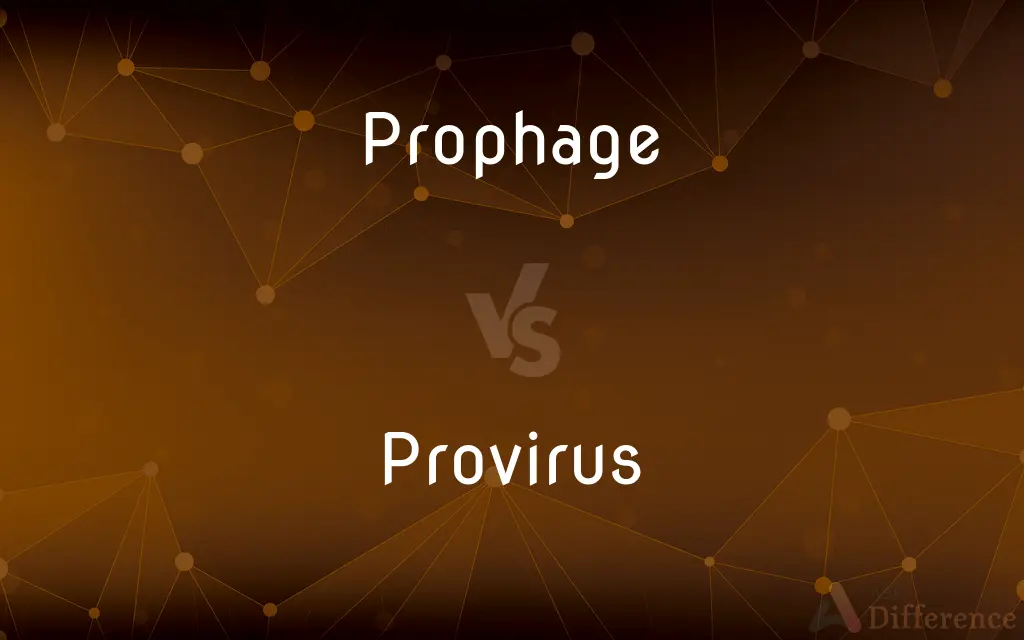Prophage vs. Provirus — What's the Difference?
Edited by Tayyaba Rehman — By Fiza Rafique — Updated on September 28, 2023
Prophage is the DNA of a bacteriophage integrated into a bacterial chromosome, while a provirus is the genome of a virus integrated into a eukaryotic host cell's DNA.

Difference Between Prophage and Provirus
Table of Contents
ADVERTISEMENT
Key Differences
Prophage and provirus both represent viral genetic material that has integrated into the host cell's genome. A prophage specifically refers to the DNA of a bacteriophage, a virus that infects bacteria, which has incorporated itself into the bacterial chromosome. On the other hand, a provirus refers to the genome of a virus that integrates into a eukaryotic cell's DNA.
Prophages are typically found in a dormant state within bacterial cells. When the conditions are favorable, the prophage DNA can excise itself from the bacterial chromosome and initiate the viral life cycle, leading to the lysis of the bacterial cell. Conversely, a provirus is usually permanent and doesn't usually excise itself. Instead, it replicates along with the host cell's DNA.
Both prophages and proviruses serve as mechanisms for viral persistence within host cells. However, while prophages can confer new traits to their bacterial hosts due to their integration (like toxin production in certain bacteria), proviruses in eukaryotic cells may lead to the onset of diseases or cancers if they interfere with critical genes or regulatory elements.
Comparison Chart
Host
Bacteria
Eukaryotic cells
Source of Virus
Bacteriophages
Any virus that integrates into eukaryotic DNA
ADVERTISEMENT
Life Cycle Involvement
Can switch between lysogenic and lytic cycles
Typically remains integrated, but can produce virions in some cases
Consequence
Can confer new traits to bacteria
Can lead to diseases or cancers in eukaryotic cells
Excision
Can excise itself to initiate the viral life cycle
Usually remains integrated without excision
Compare with Definitions
Prophage
Prophage can bestow new properties to a bacterium when integrated into its chromosome.
The presence of certain prophages makes specific bacteria virulent by producing toxins.
Provirus
Provirus is the integrated genome of a virus within the DNA of a eukaryotic host cell.
HIV, after infecting a cell, integrates its RNA as DNA into the host genome, becoming a provirus.
Prophage
Prophage is a bacteriophage's genetic material integrated into a bacterial chromosome.
The integration of the prophage into bacterial DNA provides a state of latency for the virus.
Provirus
Provirus stays within the host genome, often replicating with the cell's own DNA.
The provirus remains dormant in the host's genome, becoming active only under certain triggers.
Prophage
Prophage exists in a dormant state and can become active under specific conditions.
Under stress, a prophage can initiate the lytic cycle, causing the bacterium to burst.
Provirus
Provirus represents a persistent form of viral infection within eukaryotic cells.
The chicken leukemia virus integrates as a provirus in the bird's DNA and remains largely dormant.
Prophage
Prophage represents a stage in the bacteriophage lifecycle where it's harmoniously integrated.
Bacteria carrying prophage DNA can reproduce normally until the virus decides to enter its lytic phase.
Provirus
Unlike a typical viral infection, provirus doesn't usually cause immediate cell death.
Cells with integrated provirus can continue to function and divide, spreading the virus.
Prophage
Prophage operates within the lysogenic cycle when integrated into the bacterial DNA.
As long as the prophage remains in the lysogenic phase, the bacteria will not be lysed.
Provirus
Provirus can lead to the onset of certain diseases in the host organism.
The presence of specific proviruses in the genome can lead to the development of cancers.
Prophage
A prophage is a bacteriophage (often shortened to "phage") genome inserted and integrated into the circular bacterial DNA chromosome or exists as an extrachromosomal plasmid. This is a latent form of a phage, in which the viral genes are present in the bacterium without causing disruption of the bacterial cell.
Provirus
A provirus is a virus genome that is integrated into the DNA of a host cell. In the case of bacterial viruses (bacteriophages), proviruses are often referred to as prophages.
Prophage
The latent form of a bacteriophage in which the viral genes are incorporated into the bacterial chromosomes without causing disruption of the bacterial cell.
Provirus
A form of a virus that allows it to be integrated into the genome of a host cell and to replicate in concert with the cell's genetic material without causing cell lysis.
Prophage
(biology) The latent form of a bacteriophage in which the viral genome is inserted into the host chromosome.
Provirus
(virology) A virus genome, such as HIV, that integrates itself into the DNA of a host cell so as to be passively replicated along with the host genome.
Common Curiosities
Do prophages always stay integrated in bacteria?
No, prophages can excise themselves to initiate the viral life cycle.
What does provirus refer to?
Provirus is the genome of a virus integrated into a eukaryotic host cell's DNA.
Do prophages have a role in bacterial virulence?
Yes, certain prophages can make bacteria virulent by producing toxins.
Are prophages specific to any kind of bacteria?
No, prophages can be found in various bacteria, depending on the bacteriophage.
How does prophage integration benefit the bacteriophage?
It allows the bacteriophage to persist in a dormant state, protected from external threats.
Can prophages bestow new traits to bacteria?
Yes, prophages can confer new traits, like toxin production, to their bacterial hosts.
What's a prophage?
Prophage is the DNA of a bacteriophage integrated into a bacterial chromosome.
What can proviruses lead to in eukaryotic cells?
Proviruses can lead to diseases or cancers if they interfere with critical genes.
Is provirus temporary in a eukaryotic cell's genome?
Typically, a provirus is permanent and replicates along with the host cell's DNA.
Can proviruses be found in any eukaryotic cell?
Yes, proviruses can be integrated into any eukaryotic cell's DNA if the virus infects that cell type.
Can proviruses become active viruses?
Yes, some proviruses, like the HIV provirus, can be activated to produce new virions.
Why do some viruses choose to integrate as proviruses?
It's a survival mechanism, allowing the virus to persist, replicate with the host cell, and possibly avoid the host's immune system.
Share Your Discovery

Previous Comparison
Honorable vs. Humble
Next Comparison
Avena vs. OatAuthor Spotlight
Written by
Fiza RafiqueFiza Rafique is a skilled content writer at AskDifference.com, where she meticulously refines and enhances written pieces. Drawing from her vast editorial expertise, Fiza ensures clarity, accuracy, and precision in every article. Passionate about language, she continually seeks to elevate the quality of content for readers worldwide.
Edited by
Tayyaba RehmanTayyaba Rehman is a distinguished writer, currently serving as a primary contributor to askdifference.com. As a researcher in semantics and etymology, Tayyaba's passion for the complexity of languages and their distinctions has found a perfect home on the platform. Tayyaba delves into the intricacies of language, distinguishing between commonly confused words and phrases, thereby providing clarity for readers worldwide.
















































